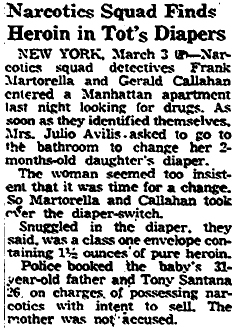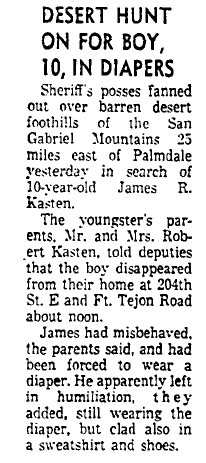February 21, 2007
Diapers, diapers, and more diapers
My post last week about the word diapers generated far more
heated discussion than I would have guessed. (Seems like anyone who's
ever had to change diapers has an opinion about them.) I supplemented
my post with a number of reader comments I received via email, with
further discussion spilling over into Languagehat
(along with at least two
other
linguablogs). And Jan Freeman
of the Boston Globe, who had originally directed my attention to the
subject, wrote about diapers
in her Sunday
column, admirably summarizing my long-winded analysis in a few
succinct paragraphs. To recap, I argued that diapers has taken on aspects of
plural-only forms (a.k.a. pluralia tantum) like pants and trousers, often appearing with the -s ending that ostensibly marks a
plural even when the referent is a single garment. The coverage of
astronaut Lisa Nowak's long strange trip was full of this usage of diapers. Jan Freeman notes a
montage of video clips shown on "The Daily Show" in which a series of
newscasters referred to Nowak "wearing diapers" during her trip, with only
Jim Lehrer of "NewsHour" saying she wore "a diaper." (You can catch the segment
on Comedy Central's website here.)
Now that I've had a chance to digest all of this diaper-talk, I see that there are some significant points that I neglected to address in my original post. I also didn't provide much historical documentation for singularly construed diapers, so I'd like to rectify those oversights in this post.
Bryan Erickson was the first of many commenters to point out that I was incorrect in assuming that Nowak wore only a single diaper during her 900-mile drive to Orlando. As reported at the time, police discovered two soiled diapers in Nowak's car, which means she changed out of them at least twice on her trip. Erickson wrote, "That limits the probative value of Nowak coverage in evincing a continuing shift to plurale tantum status for diapers." It does indeed. But based on historical patterns of usage, I still think that all the talk of Nowak wearing diapers on her trip did not necessarily refer to her multiple diaper changes — or, at the very least, the usage is ambiguous on the point of whether one or more diapers were worn.
In fact, ambiguity is at the heart of much diapers usage, much more so than I
had initially realized. Take, for instance, the 1960 quote from A.S.
Neill's Summerhill that I
provided (cited in the OED's entry for mess), in which Neill imagines a
boy's inner thoughts about a younger brother: "If I am like
him and mess my trousers the way he dirties his diapers, Mommy will
love me again." A few commenters objected to my analysis of this quote,
saying that this does not necessarily imply a single instance in which
the younger brother is dirtying his diaper(s). The verb phrase "dirties
his diapers" here can just as easily be construed to refer to many
diapers being dirtied over a long period of time. This is true also of
other common collocations with the word diapers, such as "to be in
diapers," "to wear diapers," "to change diapers," "to wet (one's)
diapers," etc. Without looking at the
surrounding context, there's no way of judging whether or not diapers is simply being used to
refer to habitual diaper-wearing (or diaper-changing, diaper-wetting,
etc.). So we need more explicit contextual information to confirm when diapers signals that a single
diaper has been marked morphologically as a plural — or rather as a dual, as I
argued in my original post, since when a diaper is worn it can take on the
duality of garments with two leg-holes like pants and trousers.
The habitual sense of "wearing diapers" is extremely prevalent and may actually have been another contributing factor to the eventual construal of diapers with a singular sense. For at least a century or two, "being in" or "wearing" diapers has been taken as emblematic of the infant stage of life. This usage has lent itself well to political jabs at a younger opponent's inexperience. For instance, when Massachusetts governor James M. Curley ran for U.S. Senate in 1936, he had this to say about his opponent, Henry Cabot Lodge: "When my youthful rival was still wearing diapers I was serving the Commonwealth of Massachusetts in the halls of Congress." Michael Hennesey of the Boston Globe suggested Lodge could use this retort: "When I was still wearing diapers, my opponent was serving a six-month sentence in Charles St. Jail." (According to Jack Beatty's biography of Curley, The Rascal King, Lodge declined to take the bait, and he ended up beating Curley soundly.)
And in 1940, after 38-year-old Thomas E. Dewey announced his candidacy for president, Franklin D. Roosevelt's interior secretary Harold Ickes said that Dewey had "tossed his diapers into the ring." Or at least that's what was reported in the Sept. 15, 1941 edition of Time. When Ickes quoted himself in the next presidential campaign, he used "diaper" instead of "diapers," according to Time's Oct. 2, 1944 edition. ("Four years ago, I observed that Mr. Dewey had thrown his diaper into the ring. At Los Angeles on Friday night, when he upbraided the New Deal for not being New Dealish enough, he threw the sponge after his diaper.") The interchangeability of diaper and diapers in the Ickes quote is, I think, further evidence that singular and plural forms of the noun often shade into each other.
But let's take a look at cases where diapers is more clearly being used for a single piece of fabric. The earliest potential example I've found so far is from 1915, in George D. Lyman's Care & Feeding of the Infant (full text available via Google Books). Twice Lyman refers to a baby being in "dry diapers," in contexts that imply a single moment in time:
All that a baby desires to go to sleep is a full stomach, dry diapers, a warm dry bed, a supply of fresh air and absolute quiet. (p. 34)
Directly before the nursing or feeding time it should be put in dry diapers and properly powdered. (p. 39)
Does a baby need more than one dry diaper in order to go sleep, or
before feeding time? Seems to me that in both quotes, a single baby is
wearing a single diaper at a single time, but the morphologically plural form is used. (Granted, this is a generalized "baby" rather than a concrete manifestation of one, but I think the point still holds.) As early as 1915, there appears to be some seepage (pardon the term!)
from the habitual sense of "being in diapers" to a singular instance of
diaper-wearing.
I looked to the funny pages for an unequivocally graphic use of diapers in a singular sense, and I
found a fine example in the "Li'l Abner" comic strip published on Dec.
24, 1938 in the Los Angeles Times and other newspapers nationwide:
Freddie's father first uses diapers in an apparently habitual sense ("I had to dress my Freddie in spotted diapers"), but Pappy Yokum's reply clearly refers to a single instance of diaper-wearing ("One of 'em lost his diapers in th' crick"). And to drive the point home, Pappy and Mammy each use the word diapers while holding a single piece of cloth. (Whether the cloth is white or spotted is a major plot point.) The usage here is so emphatic that it has been extended to an unworn diaper, unlike the vast majority of examples I've found for diapers referring to a single (worn) item resembling other garments of the "(under)pants" family.
It's possible that Al Capp used singular diapers in "Li'l Abner" in a way that was intended to be understood as part of the Ozark dialect of Dogpatch, as is true of much of the dialect writing in the strip. But by 1955, examples of singularly construed diapers can easily be found in standard prose, as in this quote from Amy Greenwood's Rolling North: "On her lap was a baby in diapers." Also from 1955 are these two newspaper items with eye-catching headlines:
 |
 |
In each article, diapers is used in the headline, even though the text of the story reveals that a single garment is being discussed. In the first ("Narcotics Squad Finds Heroin in Tot's Diapers," Hartford Courant, Mar. 4, 1955, p. 25C), heroin is discovered in a baby's worn diaper, not in a pile of diapers. And in the second ("Desert Hunt on for Boy, 10, in Diapers," Los Angeles Times, July 12, 1955, p. 9), the unfortunate boy could only be in the single diaper that his parents forced him to wear. So in both of these odd stories, we don't have to worry about the ambiguity inherent in Nowak's changing in and out of diapers.
What about the expression "a pair of diapers," which I argued was proof of diapers being understood as a dual form like "a pair of pants," "a pair of suspenders," etc.? I've found the "pair" usage all the way back to 1930, in explicitly single-use contexts (note, for instance, the first quote, in which the infantile embodiment of the New Year is described as wearing either "a pair of diapers" or not even "a diaper"):
Appleton (Wisc.) Post Crescent, Dec. 26, 1930, p. 6
For the sake of being just plain humane, we wish that when the New Year is welcomed into Wisconsin that they'll give the poor little tyke something besides a pair of diapers. Yeah, every picture you see shows him running around darned near au naturelle — sometimes he isn't wearing even a diaper — just a banner. And who can ward off pneumonia with a banner?
Chicago Daily Tribune, Oct. 11, 1932, p. 17
"How was the child dressed?" "Wore only a pair of diapers."
Hartford Courant, Jan. 17, 1939, p. 10
An incubator baby, who wore out his last pair of diapers climbing trees, reaped his reward today as the youngest ape man in movie history.
Washington Post, Sep. 6, 1941, p. 15
[Of triplets:] They're so cooperative, in fact, that the swift fingers of Mrs. Sharpe can adjust three pairs of diapers while the mother of a cross infant would be contending with one.
And finally, here's yet another comic strip supplying graphic
evidence of diaper-duality ("Moon Mullins," published in the Chicago
Tribune and other papers on Feb. 16, 1944):

(Lisa Nowak might have a thing or two to say about how far you can gad around in a pair of diapers.)
[Update: Jan Freeman follows up on the Globe's Brainiac blog.]
Posted by Benjamin Zimmer at February 21, 2007 11:09 AM